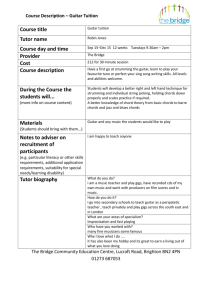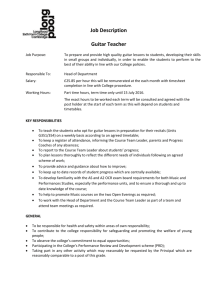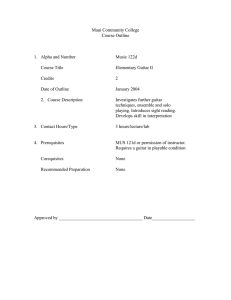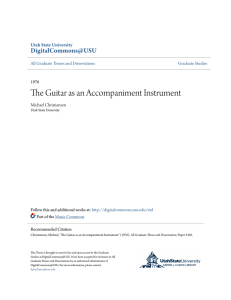MUSIC 158-S08.doc 69KB Feb 18 2014 10:47:10 AM
advertisement
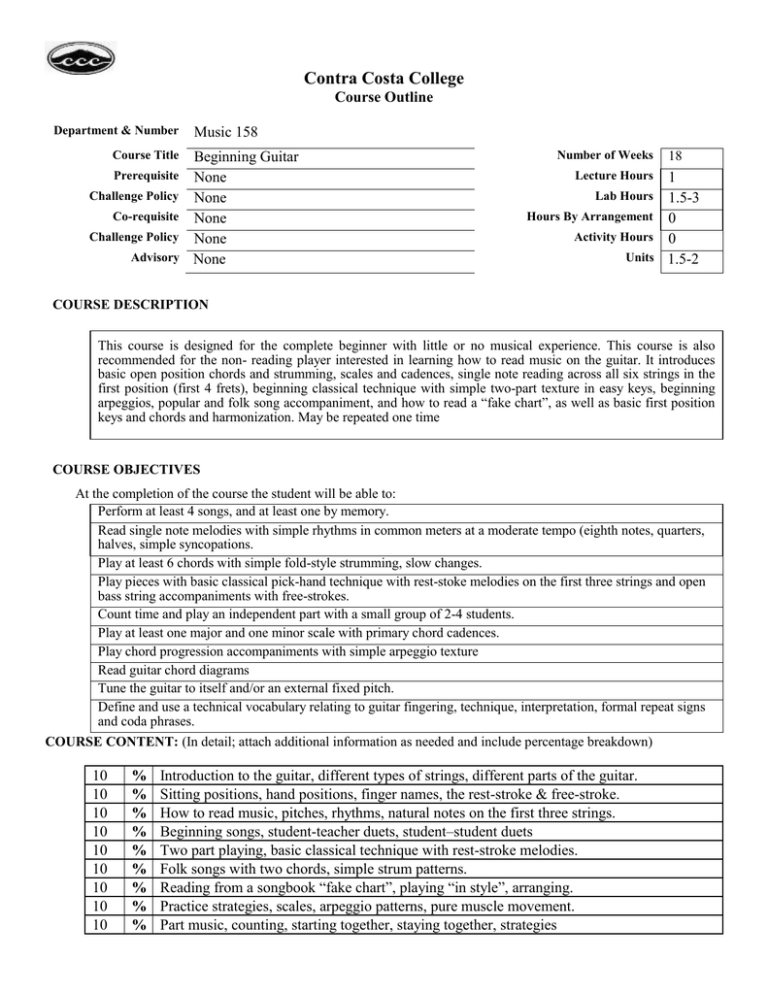
Contra Costa College Course Outline Department & Number Course Title Prerequisite Challenge Policy Co-requisite Challenge Policy Advisory Music 158 Beginning Guitar None None None None None Number of Weeks 18 Lecture Hours 1 1.5-3 Hours By Arrangement 0 Activity Hours 0 Units 1.5-2 Lab Hours COURSE DESCRIPTION This course is designed for the complete beginner with little or no musical experience. This course is also recommended for the non- reading player interested in learning how to read music on the guitar. It introduces basic open position chords and strumming, scales and cadences, single note reading across all six strings in the first position (first 4 frets), beginning classical technique with simple two-part texture in easy keys, beginning arpeggios, popular and folk song accompaniment, and how to read a “fake chart”, as well as basic first position keys and chords and harmonization. May be repeated one time COURSE OBJECTIVES At the completion of the course the student will be able to: Perform at least 4 songs, and at least one by memory. Read single note melodies with simple rhythms in common meters at a moderate tempo (eighth notes, quarters, halves, simple syncopations. Play at least 6 chords with simple fold-style strumming, slow changes. Play pieces with basic classical pick-hand technique with rest-stoke melodies on the first three strings and open bass string accompaniments with free-strokes. Count time and play an independent part with a small group of 2-4 students. Play at least one major and one minor scale with primary chord cadences. Play chord progression accompaniments with simple arpeggio texture Read guitar chord diagrams Tune the guitar to itself and/or an external fixed pitch. Define and use a technical vocabulary relating to guitar fingering, technique, interpretation, formal repeat signs and coda phrases. COURSE CONTENT: (In detail; attach additional information as needed and include percentage breakdown) 10 10 10 10 10 10 10 10 10 % % % % % % % % % Introduction to the guitar, different types of strings, different parts of the guitar. Sitting positions, hand positions, finger names, the rest-stroke & free-stroke. How to read music, pitches, rhythms, natural notes on the first three strings. Beginning songs, student-teacher duets, student–student duets Two part playing, basic classical technique with rest-stroke melodies. Folk songs with two chords, simple strum patterns. Reading from a songbook “fake chart”, playing “in style”, arranging. Practice strategies, scales, arpeggio patterns, pure muscle movement. Part music, counting, starting together, staying together, strategies 10 % Rehearsal of performance pieces METHODS OF INSTRUCTION Lecture Demonstration Audio recordings Directed group study Individual consultation Laboratory time (practice rooms) INSTRUCTIONAL MATERIALS Textbook Title: Author: Publisher: Edition/Date: Classical Guitar Technique, Vol 1 Aaron Shearer C.P.P/Belwin Mills Revised Edition, 1963 COURSE EXPECTATIONS (Use applicable expectations) Outside of Class Weekly Assignments Weekly Reading Assignments Weekly Writing Assignments Weekly Listening Assignments Other Research Assignments Hours per week 2 0 0 3 STUDENT EVALUATION: (Show percentage breakdown for evaluation instruments) 40 20 20 20 % % % % One selection from each of the four assignment groups (10% each) Overall number and quality of pieces learned Scales & cadences/chord forms – as many as you can by memory Final performance – playing with accuracy, fluency, sincerity GRADING POLICY (Choose LG, CR/NC, or SC) Letter Grade Credit / No Credit 90% - 100% = A 80% - 89% = B 70% - 79% = C 60% - 69% = D Below 60% = F 70% and above = Credit Below 70% = No Credit Prepared by: Date: Semester/Year Wayne Organ Spring 2008 X Student Choice 90% - 100% = A 80% - 89% = B 70% - 79% = C 60% - 69% = D Below 60% = F 70% and above = Credit Below 70% = No Credit
